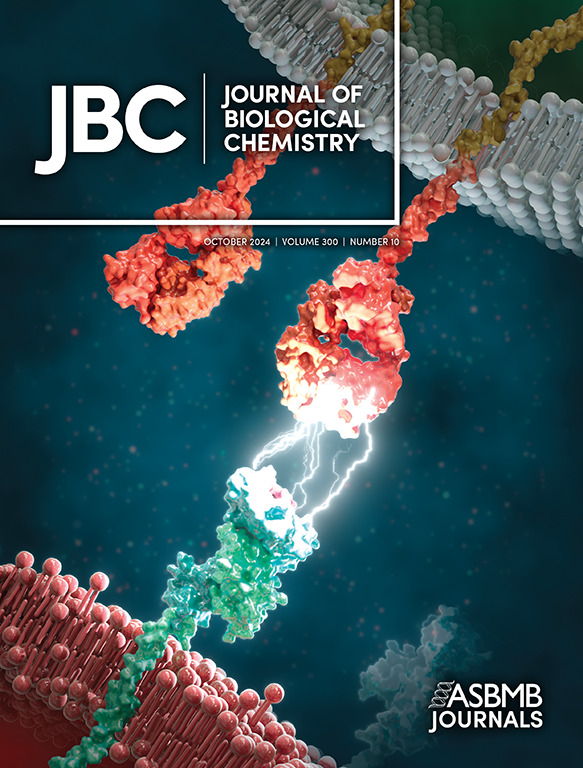The ubiquitin ligase NKLAM promotes apoptosis and suppression of cell growth.
IF 4
2区 生物学
Q2 BIOCHEMISTRY & MOLECULAR BIOLOGY
引用次数: 0
Abstract
Natural Killer Lytic Associated Molecule (NKLAM), also known as RNF19b, is a member of the RING-in between-RING-RING (RBR) E3 ubiquitin ligase family and plays a pivotal role in immune regulation. We identified a critical cysteine residue at position 301 essential for NKLAM's ubiquitin ligase function. Site-directed mutagenesis of this residue to serine or alanine abrogated the ligase activity of NKLAM. Utilizing inducible expression systems in two different cell lines, HEK293 embryonic kidney cells and K562 myeloid leukemia cells, we demonstrated that wild-type (WT) NKLAM, but not the catalytically inactive NKLAM alanine mutant (C301A), inhibited cellular proliferation, as evidenced by reduced cell numbers and decreased metabolic activity. Moreover, NKLAM expression led to a significant decrease in the abundance and stability of the proto-oncogene c-Myc, a key regulator of proliferation. NKLAM facilitated the proteasomal degradation of c-Myc, with a reduction in c-Myc half-life from 27 minutes to 12 minutes and restoration of c-Myc levels upon proteasome inhibition. Notably, prolonged NKLAM expression induced apoptosis, measured by annexin-V staining and caspase activation. Strikingly, the serine mutant, C301S, while lacking ubiquitin ligase activity, induced apoptosis comparable to WT NKLAM, highlighting an alternative pathway for NKLAM-mediated inhibition of cellular homeostasis. Our findings indicate that NKLAM is a cytolytic protein with multifaceted roles in cellular proliferation and apoptosis.泛素连接酶NKLAM促进细胞凋亡和抑制细胞生长。
Natural Killer Lytic Associated Molecule (NKLAM),也被称为RNF19b,是RING-in - between-RING-RING (RBR) E3泛素连接酶家族的成员,在免疫调节中起关键作用。我们在301位发现了一个关键的半胱氨酸残基,这对NKLAM的泛素连接酶功能至关重要。该残基对丝氨酸或丙氨酸的定点突变使NKLAM的连接酶活性丧失。利用诱导表达系统在两种不同的细胞系HEK293胚胎肾细胞和K562髓系白血病细胞中,我们证明了野生型(WT) NKLAM,而不是催化失活的NKLAM丙氨酸突变体(C301A),抑制细胞增殖,这证明了细胞数量减少和代谢活性降低。此外,NKLAM的表达导致原癌基因c-Myc的丰度和稳定性显著降低,c-Myc是增殖的关键调节因子。NKLAM促进了c-Myc的蛋白酶体降解,将c-Myc的半衰期从27分钟减少到12分钟,并在蛋白酶体抑制后恢复c-Myc水平。值得注意的是,通过annexin-V染色和caspase激活检测,延长NKLAM表达可诱导细胞凋亡。引人注目的是,丝氨酸突变体C301S虽然缺乏泛素连接酶活性,但诱导的细胞凋亡与WT NKLAM相当,这突出了NKLAM介导的细胞稳态抑制的另一种途径。我们的研究结果表明,NKLAM是一种细胞溶解蛋白,在细胞增殖和凋亡中起多方面的作用。
本文章由计算机程序翻译,如有差异,请以英文原文为准。
求助全文
约1分钟内获得全文
求助全文
来源期刊

Journal of Biological Chemistry
Biochemistry, Genetics and Molecular Biology-Biochemistry
自引率
4.20%
发文量
1233
期刊介绍:
The Journal of Biological Chemistry welcomes high-quality science that seeks to elucidate the molecular and cellular basis of biological processes. Papers published in JBC can therefore fall under the umbrellas of not only biological chemistry, chemical biology, or biochemistry, but also allied disciplines such as biophysics, systems biology, RNA biology, immunology, microbiology, neurobiology, epigenetics, computational biology, ’omics, and many more. The outcome of our focus on papers that contribute novel and important mechanistic insights, rather than on a particular topic area, is that JBC is truly a melting pot for scientists across disciplines. In addition, JBC welcomes papers that describe methods that will help scientists push their biochemical inquiries forward and resources that will be of use to the research community.
 求助内容:
求助内容: 应助结果提醒方式:
应助结果提醒方式:


